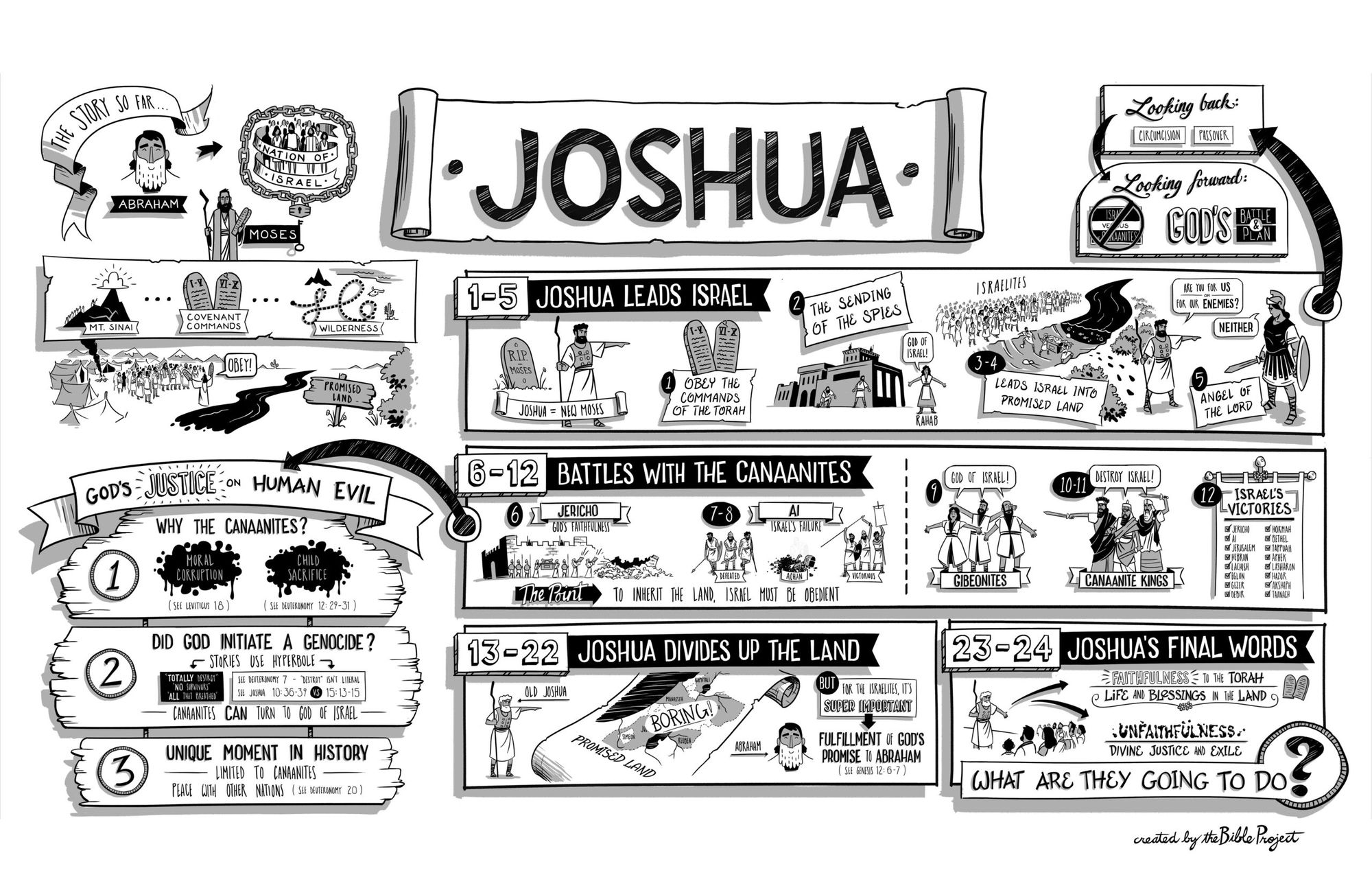
Like a good detective, let's examine this book.
🔥 Overview
The world has changed for Israel. Moses has died, and it is now Joshua's turn to lead. He is about to go into uncharted territory. For 40 years, the nation of Israel has been wandering in the wilderness and hoping for this now. It has now arrived. In Chapter 3, they cross into the Promised Land. What follows is God fulfilling His promises of blessing and justice to the nation of Israel and the pagan inhabitants of the land.
🔍 Things to Notice
- Joshua is 80 years old when this conquest begins and still leads the armies.
- The time frame is over 30 years. This is amazing because when reading, it can seem much shorter.
- Joshua's name means "Yahweh Saves."
- Throughout the book, we will hear of different people groups whose names end with 'ites." This means people group. Therefore, when the Bible says Amorites, it means "people of Amor."
🙏 Jesus in this Book
(Every book reveals the glory of God, displayed in Christ Jesus)
- Jesus is our Conquering King.
- Jesus is our Strength in Battle.
👀 Themes
- God fulfills His promises, good and bad.
- God gives us the strength and courage to take the next step.
- God's promises requires action on our part as well.
- Justice is not always pretty.
- God will avenge evil.
😀 Who?
Who wrote it: Joshua.
He likely either wrote or commissioned the recounting of these events. Scribes may have written down the last chapters.
Who is the original audience: The nation of Israel.
🪧 Where?
Where are we: The Promised Land. This is in modern-day Middle Eastern regions in the land of Canaan. They cross the Jordan in chapter 3 and do not go backward.
⏳ When?
When was it written: Approximately 1406 BC is when these events began and took 30 years to complete.
🤔 What?
What is the big idea: There are multiple reasons for the book of Joshua. The first is for a historical recounting of God giving the land back to the nation. The second reason is so they can have a record of how the land was divided so all future generations will know their boundaries. Finally, an overarching set of principles has to do with "doing life" with God.
🧐 Why?
Why is this book important: At the beginning of Joshua, we see God promising to be with him. His job is not to be afraid and move forward. In the end, we see Joshua declaring that God did everything He said He would. The journey was not a straight shot. There were peaks and valleys. There were highs and lows. There was victory and defeat. However, the final result was a victory. This is a vital lesson for us. God's plan of conquest often will look differently than we had imagined. Sometimes this is because His plan is different. Sometimes this is because of detours we bring upon ourselves. But, by the end of the journey, God plans to get us where we need to be.
📝 How?
How can I apply it?: One of the greatest lessons of Joshua is the partnership required to receive the promise God has. Have you ever played the game Monopoly? There is a can collect called the "Get Out Of Jail Free" card. If you have this card and roll the bad number, you can lay down this card and not have to go to jail. Many people think the promises of God are like "Get Out Of Jail Free" cards. When we need something or something bad happens, we quote a promise from God's Word, and everything disappears. This is different from how it works. God COULD do this, but He is interested in making us part of the process. God could have caused the pagan nations to leave before Joshua crossed the Jordan. However, God was doing so much more than giving them a place to live. He was teaching them how to keep their land from invading nations. He was teaching them how to trust Him. He was giving them the land slowly so they could handle its scope. There were many reasons why God chose to do it this way. The lesson for us is that the promises of God would be better seen as God's open doors and partnership. God will do the miracles; we do the work.
Additional Apologetic Question: Is God a Moral Monster?
God can do what He wants. This is the least satisfying answer but the most true. If God is indeed Sovereign, then every birth and death are because of Him. So a problem with this book is that it is less to do with God's greatness and more to do with our inability to understand it.
God is providing long-awaited justice. In another place, God's Word says they would not be able to invade Canaan until the "iniquity" of the nations had been complete. For over 400 years, these pagan nations had committed various atrocities. One of them was the paganistic worship of a false god named Molek. Part of this worship was roasting their kids alive! Plutarch says they would bang the drums loudly during this ceremony so the parents could not hear their kids scream! God is bringing justice.
Hyperbolic language. Many scholars believe Joshua contains exaggerated language. We do this today. When a team wins a game by a lot, they slaughter the other team. They didn't kill anyone. It's exaggerated language to illustrate the severity of what happened. This may have been the case because Joshua would be told to kill everyone, then later instructed on how to trade with them. This may mean ultimately defeating them.
This was not a "Kill All" order for the entire region. This was only for those who were not willing to leave. This was the land of the Israelites during the time of Abraham. Their time was over. Those who stayed and wanted to fight were given a fight.
The bottom line is that Joshua is a book of war. War is terrible and so it is understandable to have a question. However, don't let your questions stop you. Let it cause you to dig deeper. Below are some resources to help you discover more.



